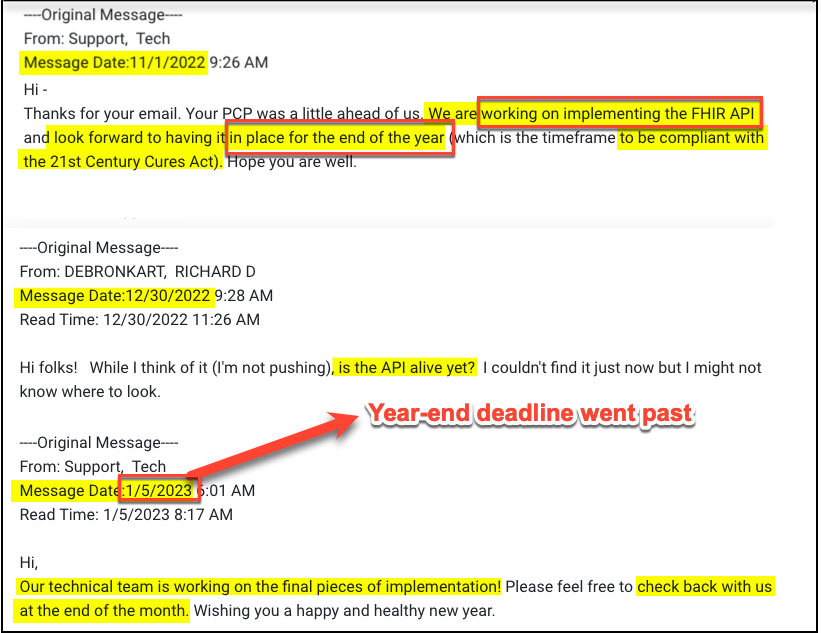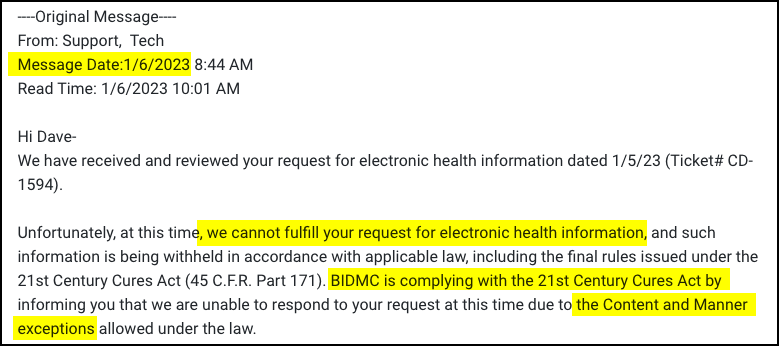I am really irritated. My hospital has told me they’re not supporting the federally required FHIR standard (a “FHIR endpoint”) to let me access my health data. Is this legal??
—————
Important update: a robust Twitter thread is drawing lots of answers on whether this is legal. Some of it is “gray area” but among other things:
- At present, even if their behavior is a violation, there’s no penalty!
- But by end of 2023, if they don’t have this, they might not get any more payments from CMS!
- That’s Medicare and Medicaid, which are about 40% of all US hospital revenue
- There are three separate requirements.
- System vendors are required (today) to offer a FHIR endpoint to their buyers (hospitals).
- Well-known large vendors like Epic and Cerner offer it.
- But Beth Israel Deaconess is its own system developer, and they haven’t created one.
- Care providers (hospitals etc) aren’t required to buy them and offer them to patients (yet)
- But by end of 2023, providers will have to offer this to patients, if they want to get paid by CMS (Medicare).
- System vendors are required (today) to offer a FHIR endpoint to their buyers (hospitals).
—————
Resuming the original post:
After a full decade of agitating for “gimme my damn data” [see the music video] and “I want a health data spigot,” finally on October 6 a new “21st Century Cures Act Rule” went into effect saying that every American hospital must make patients’ data available to them online, in a format called FHIR (“fire”), via an online interface called an API, so we can import it into any app we want.
Finally I’d be able to pull together all my records from everywhere I’ve gotten care (six places in recent years). Finally I’d be able to start organizing things, combine test results from different providers in one list, correct inconsistencies, and start the long process of building a “this is me” medical profile of my own. Finally!
The deadline for hospitals to do it was end of year. But now my damn hospital, Beth Israel Deaconess (now part of Beth Israel Lahey Health), says they think they don’t have to do it, so they’re not going to do it!
The place where I get my primary care will not make my data available by FHIR! They won’t be part of my consolidated record!
This is a surprise to me, because back in November they said it would be ready on schedule by year end. Here are screen captures of some of our messages:

End of January, now? This is not looking good. But I decided to be patient; software projects can slip.
Then, the very next morning, the project apparently got cancelled, and they said they’re going to withhold my data. For this message, the legals stepped in with a completely different voice:

Yes, my hospital, this hospital that used to be a world leader in health IT, says they can’t do it. “Cannot.” “Unable.”
I’m tired of this. Do they just not want to?? In 2016 their (former) CIO said patients wanting data is a fiction: he blogged publicly that of their 2 million patients not one had ever requested a download … but when I pushed back to learn how I could do so, tech support said they don’t have a way to do it. (Yes, they don’t have a way to do what the CIO said nobody had ever tried. Read that story, with links and screen captures, here: Dear John: *I* want to download my records.)
In 2009 the same team had claimed to be the first to successfully connect patients’ data to Google Health, but that turned out to be a complete farce: instead of my medical record, they sent Google my billing history, which was full of errors (and besides, it wasn’t my health data). (Read that story here: Imagine someone had been managing your data, and then you looked. It ended up on the front page of the Boston Globe.)
This has been going on for 14 years now! Gimme my damn data, guys! That CIO has been gone three years, and we still come to this??
“We’re almost finished with the FHIR API!
Oops, I mean we’re not doing it.”
Exceptions to the rule?
There are indeed exceptions to the requirement that patient data must be made available. They’re spelled out in this PDF. The one Beth Israel cited is the Content and Manner exception (page 4), where they’re apparently invoking the part that says they’re “Technically unable to fulfill the request.” In that case, they must fulfill my data access request in an “alternative manner.” I asked what that was, and got this reply:

These are the options I’ve always had: manually page through and download the partial information available on their portal, piece by piece, or call Medical Records.
In other words, they have done nothing to comply with the regulations.
(I left a voicemail for Medical Records on May 3. They haven’t called back.)
Is this in fact complying with the law?
So we’re left with my headline question: is this seriously complying with the Oct. 6 rule?? If so, why shouldn’t every hospital just say “Sorry, not gonna do it, it’s too harrrrrrd.”


I’m quite appalled at this story, Dave. Have you considered filing an Information Blocking complaint? It seems as if the situation would be ripe for it and it would be a way to draw attention to this stance and also get clarification on how serious ONC is about their rules.
Before I take that step, I want to collect as much information as I can.
One problem for me in these months has been how hard it is to get clarity on this.
(Contrary to some rumors, I’m not a hater – I just want my damn data, and I honestly have to wonder, WTF happened between November and January?? They ain’t tellin’ me!)
Wow, just wow. Imagine that you, who are well apprised of all of this, cannot get your data. I deal with thousands of parents of sick kids trying to get their damn data – they don’t have the background to fight this (which is why we do). Just wow.
“Final pieces of implementation…” and then NO?
btw here is where anyone can report a proposed violation. It’s great that they have it online!
https://inquiry.healthit.gov/support/plugins/servlet/desk
Is Mass General Brigham providing this data?
As an aside, I too largely chose BI for care starting around 2006 or 2008 because of the Patient Site portal. However, the functionality of the portal has not really largely changed or improved, other than Open Notes, since about 2008. I do recognize Open Notes though as a huge development and it appears its now in place in a lot of provider sites!
I think Mass General Brigham’s iteration of Epic with Patient Gateway provides a pretty robust solution. For instance, some but not all providers, you can self schedule appointments, and lab tests and progress notes appear to go online in real time! Where as with BI, I find the notes take days to get approved or finalized for online viewing.
Also BI’s portal has accessibility issues for viewing lab results for screen readers who are blind. Though the other day, I learned BI is migrating to Epic!
I’d also highlight One Medical Group as having superior patient user experience with in their digital platforms. You can fully book and manage appointments, see providers in offices across the country, etc. The one irony is to read the progress notes, I have to use the Mass General Brigham Patient Gateway Epic portal! In other words the Amazon owned One Medical does not appear to readily provide the progress notes in their own app or portal!
Sorry to ramble on about so many topics, and good luck gtetting the BI to give you your data. Just like going to BI, I’ve largely migrated away from it because of a lack of innovation in these self services.
Right now I’d say the best in class in Boston are both Mass General Brigham and One Medical; and thats where I largely go! You can also access Tufts and other Epic based providers and facilities electronic services through MGB Patient Gateway! Probably by accident, the MGB Patient Gateway portal and app is a bit more digitally accessible than other sites within Epic! The Epic Bed Side is really cool as well, I saw that during an MGB research sleep study where I spent my first night ever as an inpatient!
Maybe it has improved, but I found the OneMedical portal deeply lacking. No ability to see lots of data; no explanations of test results; lots of repeated entry.
Mika, no – Beth Israel Deaconess is a separate company.
It will be interesting to see what the ONC says about this. Seems like if an organization is allowed to simply say “no” or “we can’t” or “we won’t”…that pretty much makes the requirement void. What is to stop every EHR vendor or org from doing that?
I am sorry for all your aggravation. That is exactly the reason I suggest decentralizing medical records.https://doctorsonsocialmedia.com/universally-accessible-personal-medical-records/
It’s crazy, indeed! The first law of doctors is « do not harm » (Hippocrate)
And that’s exactly what they do!
Can we help for the other 5/6 hospitals you have been to? We can try to use Andaman7 to aggregate a COPY of your data on YOUR device (locally, nothing in the cloud)…
http://bit.ly/a7vkblogen
http://www.andaman7.com